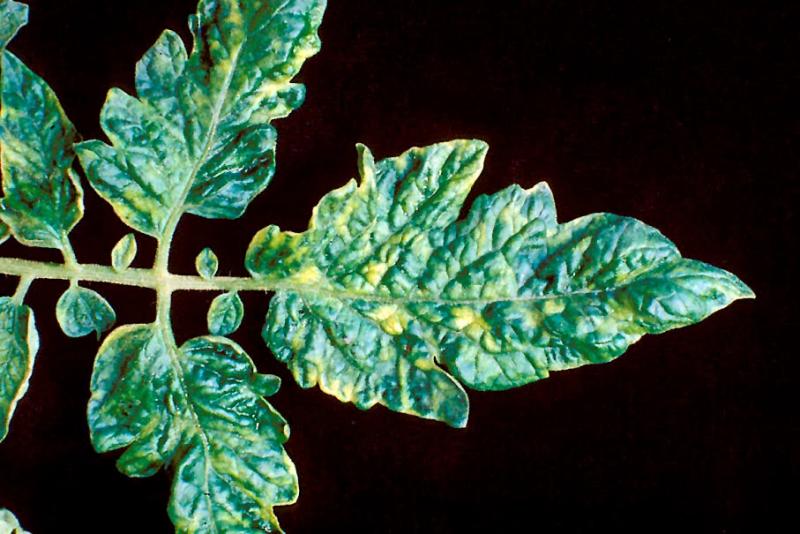What can be done about a disease that cannot be seen, but which kills people? The Italian port city of Ragusa slowed down the advance of the bubonic plague by keeping newly arriving sailors in isolation until they showed no sign of infection. At first the sailors were kept on their ships for 30 days (a trentino in Italian).
In the garden we have mosaic viruses, named after the mosaic-like discoloration on the leaves. Mosaic virus can infect more than 150 types of plants, including common vegetables such as cucumbers, tomatoes, squashes and cauliflowers. Infected leaves are splashed with yellow or white streaks and may look blistered. Tomatoes and pepper plants can become stunted and weak.
A common mosaic virus is cucumber mosaic virus, which is often spread by aphids, and attacks cucumbers as well as other crops such as tomatoes, squashes and melons. Another common mosaic virus is tobacco mosaic virus, which usually spreads through seeds as well as direct contact.
Once plants become infected with a mosaic virus, there is no treatment other than ripping up the infected plants and destroying them. Never add them to a compost pile, because the virus could live and spread through the compost.
You can spread viruses just by working in the garden or from infected tools, so always disinfect your garden tools in a solution of one part chlorine bleach to four parts water. Because viruses spread easily among damp plants, avoid weeding when the soil is wet. Tobacco mosaic virus can be transmitted from your hands after handling cigarettes and other tobacco products, because the virus survives the tobacco-curing process. Be sure to wash your hands after touching tobacco. Try not to reuse potting soil, pots, and even garden twine, because all of these can harbor viruses.
The best defense is to plant virus-resistant varieties of vegetables. Eggplant varieties with good virus resistance include Dusky, Epic and Imperial. Peppers that are resistant to viruses are Crusader, Telestar and Paladin.
Sweet Million cherry tomato (Solanum lycopersicum) is an early maturing tomato resistant to viruses. They can be harvested in just 65 days and yield huge numbers of tasty half- to three-quarter-ounce red cherry tomatoes. For orange cherry tomatoes that are virus resistant, try Sun Sugar tomato, which produces lots of half- to three-quarter-ounce, very sweet tomatoes. Sun Sugar is also high in Vitamin A. Juicy Sun Sugar tomatoes often win taste contests.
For a virus-resistant slicing tomato, nothing beats Italian Goliath. This hybrid not only fights off viruses but has good yields of half-pound, brilliant-red beefsteak tomatoes. The sweet, meaty, juicy tomatoes are ideal for salads, sandwiches, and anything Italian.
So if you want to avoid viruses in the garden, try planting resistant varieties. Oh, and that 30-day isolation period for sailors was later increased to 40 days, or in Italian 'a quarantine,' which is where we got our word for forced isolation.





















































